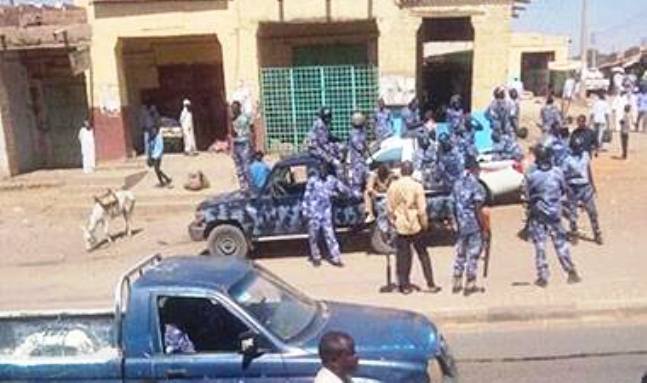Darfur traditional leaders say collection of illegal weapons contingent on restoring security

August 11, 2017 (EL FASHER) – A number of native administration leaders and activists in Darfur have expressed fears over government measures to collect illegal weapons saying the move should be preceded by comprehensive reconciliations among the various tribes to end a series of protracted conflicts in the restive region.
During a visit to Darfur’s five states in April 2016, the Sudanese President Omer al-Bashir said there is a need to collect illegal weapons from the hands of civilians, admitting that tribal clashes have become the first source of violence that displaced thousands of civilians in Darfur.
He said there will be a first phase where people will be called to voluntarily hand over their arms, adding that the second step will be heavy disarmament operations and legal action will be taken against those who didn’t deliver their weapons.
The government then formed Darfur Disarmament Higher Committee (DDHC) under the chairmanship of the Vice-President Hassabo Mohamed Abdel-Rahman.
However, since last month the government has stepped up its rhetoric regarding the collection of illegal weapons as the Defence Minister Awad Ibn Ouf threatening to collect illegal weapons from the residents even if it requires the use of force.
He also pointed to a government plan to restructure the government militias, underscoring it is an important step before to carry out the disarmament campaign.
Since the beginning of this week, the head of the DDHC is touring Darfur’s five states to enforce the collection plan aiming to impose the authority of the state.
On Monday, he announced in El-Fasher, North Darfur capital the campaign would be carried out immediately and instructed to arrest people with criminal records, saying the presidency has authorized the army and security forces to collect illegal arms and seize unlicensed vehicles.
However, some native administration leaders told Sudan Tribune that civilians are forced to carry weapons to defend themselves in the absence of the state authority and the lawlessness situation in the region.
They stressed the comprehensive security could be restored only if illegal weapons were collected from all individuals and militias without exceptions.
The government turned to Arab tribal militias to quell the revolt that erupted in the region in 2003 because the Sudanese army, weakened by a long civil war in the South and made up largely of non-Arab recruits, could not be relied upon to crush the rebellion among non-Arab Darfur tribes.
Reliable sources told Sudan Tribune the government moved to legalise these militias under various names such as the Border Guards Forces and the Rapid Support Forces saying, however, the tribes turned their guns against each other in bloody clashes that claimed lives of thousands of people.
According to security reports, large quantities of weaponry have been smuggled into Darfur through the open borders and particularly from Libya and Central African Republic (CAR).
During the period from 2007 to 2017, more than 730 tribal clashes took place in Darfur leading to the killing and displacement of thousands of the residents.
Numerous reconciliation conferences and mediation efforts by the state and federal governments have failed to end the violent clashes among the various tribes.
Last week, East Darfur government and the Sudanese army carried out a large arrest campaign against dozens of the native administration leaders of the Rizeigat and Ma’alia tribes following the resumption of the bloody clashes between the two sides.
The army arrested more than 93 armed tribesmen and seized their weapons. Also, a joint force from the army and security has confiscated more than 470 pieces of various weapons following a large raid on a number of villages of the two sides.
Mohamed Ahmed, a native administration leader from the Gimir tribe in South Darfur state told Sudan Tribune that the relative calm was a result of the power balance among the tribes, saying each tribe is defending itself.
“Certain tribes had used government weapons and military vehicle to fight their foes … and most of the soldiers of the joint forces who seize weapons by force are members of the same tribes, so how can the rivals trust them,” he wondered.
Speaking to Sudan Tribune, activist Saleh al-Nur Jaber described the decision to collect illegal arms as “very important”, saying however the government should first restructure the native administration away from politicization and then hold genuine reconciliations to end the tribal conflicts.
He pointed out that the committee for collecting illegal weapons should be neutral, fair and serious, saying several members of the current committee do not enjoy the trust of many tribes.
Ali Mukhtar, another native administration leader from West Darfur said the collection of illegal arms without exception would bring peace, describing it as “popular demand” to reassure the residents.
He added the mission of the committee would be uneasy due to a number of reasons including the turbulent situations in several neighbouring countries which constitute the major source of illegal weapons including Libya, South Sudan and the CAR.
Mukhtar called on the government to shut down the borders with these neighbours to ensure that weapons are not smuggled into the country.
He stressed the comprehensive security could be restored only by collecting all illegal arms without exception, saying the issue pertains to imposing the authority of the state and the rule of law.
Sulieman Ahmed, a native administration leader in North Darfur said the collection of illegal weapons requires the strengthening of trust between the residents and the government which was lost due to the ongoing civil war in the region.
He pointed out that trust would be restored when the residents enjoy security and stability, calling for the need to address the effects of war such as displacements and grievances.
(ST)-#
